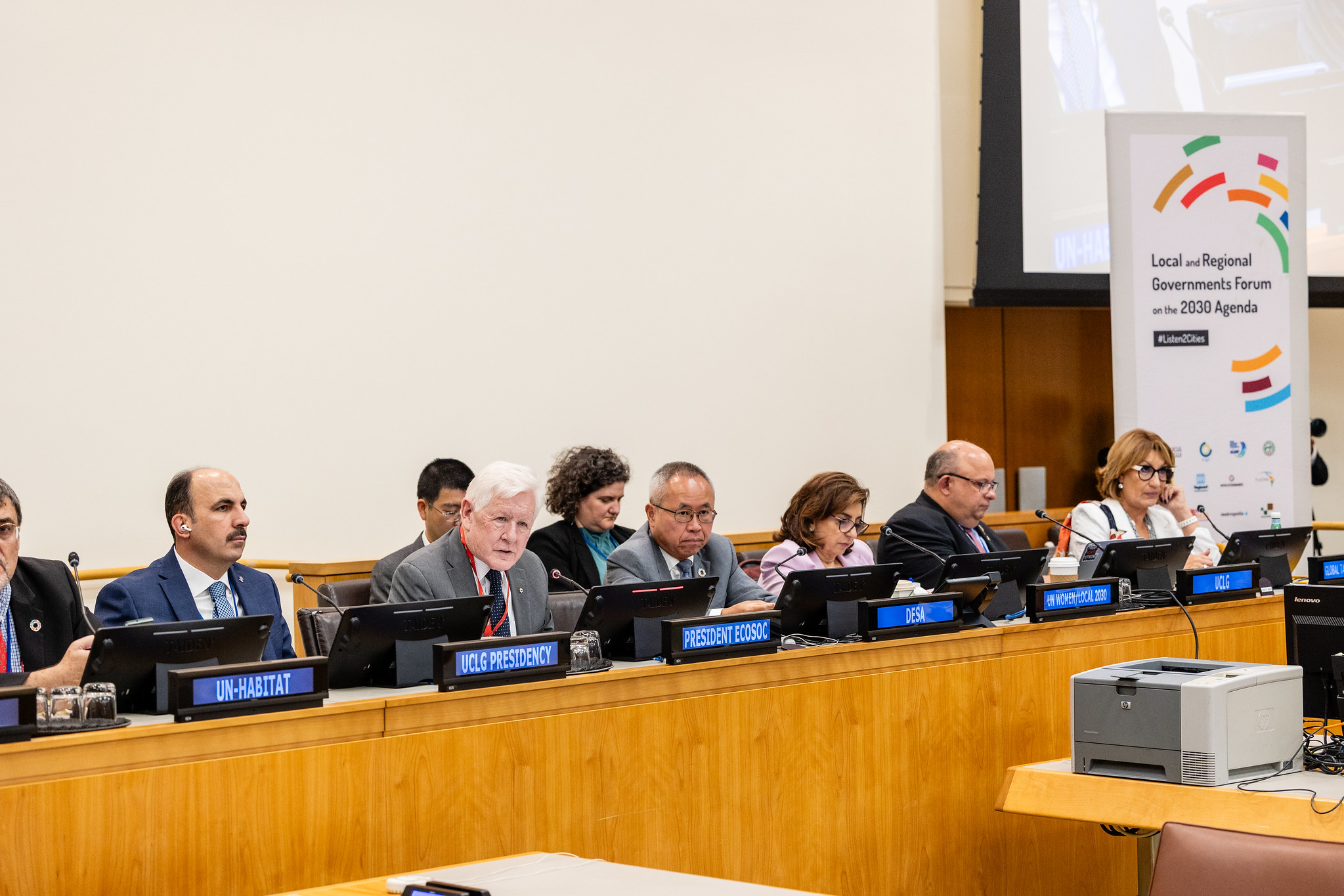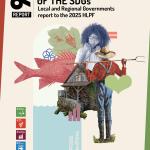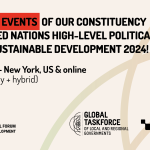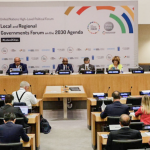
New York, July 16, 2025 – As the world enters the final five-year to achieve the 2030 Agenda, over 30 local and regional governments gathered within the Global Taskforce of Local and Regional Governments, together with UN agencies, civil society organizations, and national governments representatives gathered at the United Nations to call on themselves as partners for the transformation of the multilateral system.
At the Local and Regional Governments Forum (LRGF), held as part of the UN High-Level Political Forum on Sustainable Development, local and regional governments from across the globe emphasized their pivotal role in rescuing the SDGs amid rising geopolitical tensions, funding gaps, and faltering national commitments.
With just five years remaining, the countdown to 2030 demands bold, coordinated action. Local and regional governments (LRGs) are already delivering solutions impacting millions of lives through rights-based public services, local partnerships, and grounded community action rooted in proximity, care, and democratic participation. As the democratic level of government closest to people, LRGs translate global goals into local action, protect human rights, and co-create solutions with their communities, residents, cities and territories.
Opening the Forum, H.E. Bob Rae, President of the UN Economic and Social Council (ECOSOC), warned that progress on the SDGs is off track, calling sustainable development “not a theology, but a necessity.” He urged national governments to stop “pretending” the global crisis isn't happening, and to recognize that “most of what matters happens in cities and regions.”
His call was echoed by Li Junhua, UN Under-Secretary-General for Economic and Social Affairs, who underscored the urgency of the moment. “The clock is ticking. We cannot achieve global goals without local action,” he said, referencing upcoming global events, including the Doha Summit, as crucial opportunities for local inclusion.
Speaking on behalf of the Global Taskforce of Local and Regional Governments, Uğur İbrahim Altay, Mayor of Konya and member of the UCLG Presidency, emphasized that subnational authorities can no longer be seen as implementers. They are, he argued, political actors and co-creators of a new social contract. “Multilateralism must be inclusive and grounded in territorial solidarity,” he stated, closing his speech with a powerful reference to Gaza: “If we want children to play without fear, we must first listen to Gaza’s silent cry.”
From the Dominican Republic to Germany, city leaders expressed similar sentiments. Mayor Nelson Núñez (Samaná) called for stronger financial mechanisms to support local implementation. Maria Clara Muzzio, Deputy Mayor of Buenos Aires, reminded attendees that “development is not spontaneous,” but rooted in local policy-making.
Carlos Martínez, Mayor of Soria and UCLG Special Envoy on the New Urban Agenda, stressed the need for prioritizing investment in communities, echoing the key commitments made during the 4th Financing for Development Conference in Seville, while Eckart Würzner (Heidelberg, Germany) said plainly: “We are not NGOs. We are not visitors. We are here to lead.”
María Carrizosa of Habitat for Humanity wrapped up the first panel by placing housing at the heart of the issues and solutions for our communities. Housing, she argued, the “center of development,” receives far less attention than it should. Without secure housing, she said, other human rights “remain elusive.”
A powerful intervention by a youth representative reminded the room that 250 million children are still out of school — a statistic that reflects deeper systemic failures. “The education model no longer meets the needs of current generations,” they said.
Cities Countdown to achieve the global goals
Later sessions dove into the “Cities Countdown to 2030,” with local leaders presenting findings from the Annual Localization Report Towards the Localization of the SDGs, presented by the Global Taskforce. Local and regional governments presented outcomes of local reporting, focusing on the SDGs under review this year (SDGs 3, 5, 8, 14 as well as SDG 17). Rohey Malick Lowe, Mayor of Banjul, framed the current state of affairs as a “countdown to public investment and care-based economies.”
From Sweden, Emil Broberg reported that 90% of Nordic municipalities are already working on SDGs. In Jakarta, Governor Pramono Anung celebrated 98% alignment with SDG 3 on health and noted improvements in public safety for women. Carmen Paz, Mayor of San Nicolás drew attention to women’s underrepresentation in leadership, while Antonio Pulgar Lucas, Mayor of Huaunco called for more autonomy to enact public policies.
Xavier Garcia Albiol further reiterated the importance of financing local and regional governments, delivered a stark message: “Without adequate financing, the SDGs will never be achievable.”
From national governments, Antonio da Costa e Silva, Chief International Adviser, Ministry of Cities, Brazil highlighted Brazil’s urban‑focused ministry, the need to tackle inequality, and hopes that COP30 will be “the COP of cities,” with localized NDCs Álvaro Díaz – Deputy Director, Multilateral & European Development Policies, Spain noted the contribution ofSpain to the SDG common fund and called for stronger localized financing and capacity‑building.
Oli Henman, NGO Major Group, MGoS coordination mechanism commended the commitment of local and regional governments to the 2030 Agenda, in a moment in which national governments are often stalling progress or outright rejecting it. Ishaan Shah, Stolen Dreams, Beijing+30 Youth Steering Committee, Generation Equality Action Coalition Feminist leadership emhpasised SDG5 as a catalyst for development. “As we commemorate the 30th anniversary of the Beijing Declaration, this year’s HLPF must deliver for all women and girls and for all people.”
The final Panel, chaired by Mª Eugenia Gay, Vice President of the Barcelona Provincial Council, leaders envisioned the future of local public service provision. Felipe Paullier, UN Assistant Secretary-General for Youth Affairs, praised young people for leading transformation: “They bring urgency, but an urgency that is accompanied by optimism, and solutions.”
Contributions from regions like Koulikoro (Mali), Malta, and Francisco Morato (Brazil) shared experiences in expanding access to basic services, housing, education, and digital transport.
Nazia Rehman of the Council of Europe urged fiscal devolution to fund the green and digital transitions, while Ildo Gusmão, Mayor of Francisco Morato, championed participatory governance and laws enshrining SDGs into municipal frameworks.
Ethan Young, Public Services International, expressed the point of view from labour unions highlighting how “Our current system excludes those closest to the frontlines: Local governments, trade unions, and communities”. To overcome this, and to fully achieve SDG 8, he called on local leadership and commitment to local workers as a beacon of development..
The national government perspective was brought forward by Rosemarie G. Edillon – Under‑Secretary, Department of Economy, Planning and Development of the Philippines stressed partnerships and youth engagement as foundations of public trust and inclusive development; and Brian Wallace, Permanent Representative of Jamaica to the UN urged local governments to foster inclusive dialogue and amplify community needs.
Local and regional governments leading a renewed social contract
Closing the event, Marcos Neto (UNDP) applauded the energy and leadership of local governments as partners for transformation: “At a time where multilateralism is under strain, you #LRGs are keeping the promise of the #2030Agenda alive, but also showing everyone how it’s done. We are seeing this through your VLR s and VSRs.
Bheke Stofile, President of SALGA and UCLG Copresident, demanded political recognition and resources. “We don’t just want the door to open for local and regional governments: we want a seat at the table.” Fréderic Vallier and Jordan Harris, on behalf of networks of the Global Taskforce present at the Forum (AIMF and Regions4 respectively) echoed this call for a renewed multilateralsim.
Anaclaudia Rossbach – Executive Director, UN‑Habitat: Called for systemic transformation with a gender lens and reaffirmed the Seville Platform for Action and the outcomes of the 4th Financing for Development Conferecnce.
The final word went to Guy Ryder, UN Under Secretary-General for Policy, who described the Forum as “a testament to walking the path together,” reinforcing that multilevel governance will be essential to achieving the 2030 promise”
The LRGF 2025 made it clear that, if the world is to make good on its sustainable development promises, it must move power, financing, and decision-making closer to the communities that we represent. Development will only happen if we stop treating local and regional governments as passengers but, rather, if they are empowered to take the wheel.



